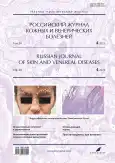Autoimmune pemphigus: diagnostic challenges, interdisciplinary interaction, and therapeutic errors
- Authors: Tlish M.M.1, Kuznetsova T.G.1, Naatyzh Z.Y.1, Inyukhina E.A.2, Usikova A.G.2
-
Affiliations:
- Kuban State Medical University
- Clinical Skin and Venereal Diseases Dispensary
- Issue: Vol 28, No 4 (2025)
- Pages: 477-488
- Section: DERMATOLOGY
- URL: https://bakhtiniada.ru/1560-9588/article/view/350476
- DOI: https://doi.org/10.17816/dv677768
- EDN: https://elibrary.ru/WGDQLJ
- ID: 350476
Cite item
Abstract
Patient safety is a fundamental principle in the provision of medical care. In the Russian Federation, continuous efforts are undertaken to reduce the number of adverse events, including through systematic analysis of medical errors and undesirable incidents. To illustrate these issues, the article presents four clinical cases of patients with various forms of acantholytic pemphigus. Particular attention is given to the young age of the patients and the clinical course of specific forms of acantholytic pemphigus. The paper discusses shortcomings in medical care, including violations of differential diagnostic algorithms, lack of interdisciplinary continuity, and therapeutic strategy failures. It is reported that diagnostic and therapeutic errors contribute to a more severe course of dermatosis and the transformation of one pemphigus form into another.
Timely diagnosis of pemphigus, which belongs to the group of autoimmune bullous dermatoses, is a crucial step in patient management and prevents progression of autoimmune forms in the absence of pathogenetic therapy. Diagnostic criteria include medical history, clinical presentation, cytological examination for acantholytic cells from the base of mucosal and/or skin erosions, histopathological examination of skin biopsy samples from lesions (including direct immunofluorescence methods), and/or indirect immunofluorescence testing of serum to detect IgG and IgA autoantibodies.
The article emphasizes the importance of adherence to clinical guidelines, increasing awareness among physicians of related specialties about current features of bullous dermatoses, and improving coordination among specialists from different disciplines. Addressing these issues will improve the quality of medical care and enhance patient safety.
Full Text
##article.viewOnOriginalSite##About the authors
Marina M. Tlish
Kuban State Medical University
Email: tlish_mm@mail.ru
ORCID iD: 0000-0001-9323-4604
SPIN-code: 8452-4062
MD, Dr. Sci. (Medicine), Professor
Russian Federation, 179 Rashpilevskaya st, Krasnodar, 350051Taisiya G. Kuznetsova
Kuban State Medical University
Author for correspondence.
Email: taya1504@mail.ru
ORCID iD: 0000-0002-0426-5167
SPIN-code: 1315-2363
MD, Cand. Sci. (Medicine), Assistant Professor
Russian Federation, 179 Rashpilevskaya st, Krasnodar, 350051Zhanna Yu. Naatyzh
Kuban State Medical University
Email: nzhannau@mail.ru
ORCID iD: 0000-0001-9754-5063
SPIN-code: 3680-1603
MD, Cand. Sci. (Medicine), Assistant Professor
Russian Federation, 179 Rashpilevskaya st, Krasnodar, 350051Ekaterina A. Inyukhina
Clinical Skin and Venereal Diseases Dispensary
Email: chernenko_ea@mail.ru
ORCID iD: 0000-0003-0919-1184
SPIN-code: 7616-5864
Russian Federation, Krasnodar
Anastasia G. Usikova
Clinical Skin and Venereal Diseases Dispensary
Email: usikova1992@mail.ru
ORCID iD: 0000-0003-1547-931X
SPIN-code: 6185-1682
Russian Federation, Krasnodar
References
- Tlish MM, Kuznetsova TG, Naatyzh ZhYu, Sycheva NL. Differential diagnostic search in dermatologic practice and its effect on quality of medical care: Clinical cases. Kuban Scientific Medical Bulletin. 2023;30(6):89–101. doi: 10.25207/1608-6228-2023-30-6-89-101 EDN: LATEBF
- Tlish MM, Kuznetsova TG, Naatyzh ZhYu. Clinical analysis of iatrogenic diseases in the provision of medical care to patients with psoriasis. Vrach. 2018;29(11):82–88. doi: 10.29296/25877305-2018-11-19 EDN: YOUBZB
- Tlish MM, Kuznetsova TG, Naatyzh ZhYu, et al. Clinical guidelines determine the quality of medical care in dermatovenerology. Russian Medical Inquiry. 2020;4(10):637–641. doi: 10.32364/2587-6821-2020-4-10-637-641 EDN: EXBKQX
- Teplyuk NP, Kolesova YV, Mak DV, et al. Pemphigus: New approaches to diagnosis and disease severity assessment. Russian Journal of Skin and Venereal Diseases. 2023;26(5):515–526. doi: 10.17816/dv492306 EDN: MSAHYT
- Timóteo RP, Pessoa-Gonçalves YM, do Carmo Neto JR, et al. A global view of pemphigus: Geographical variations. Clin Rev Allergy Immunol. 2024;66(1):14–29. doi: 10.1007/s12016-024-08980-w
- Bastuji-Garin S, Souissi R, Blum L, et al. Comparative epidemiology of pemphigus in Tunisia and France: Unusual incidence of pemphigus foliaceus in young Tunisian women. J Invest Dermatol. 1995;104(2):302–305. doi: 10.1111/1523-1747.ep12612836
- Bulgakova AI, Khismatullina ZR, Gabidullina GF. Prevalence, etiology and clinical manifestations of blistering disease. Medical Bulletin of Bashkortostan. 2016;11(6):86–90. EDN: XDZELD
- Kridin K, Zelber-Sagi S, Khamaisi M, et al. Remarkable differences in the epidemiology of pemphigus among two ethnic populations in the same geographic region. J Am Acad Dermatol. 2016;75(5):925–930. doi: 10.1016/j.jaad.2016.06.055
- Langan SM, Smeeth L, Hubbard R, et al. Bullous pemphigoid and pemphigus vulgaris. Incidence and mortality in the UK: Population based cohort study. BMJ. 2008;337(7662):a180. doi: 10.1136/bmj.a180
- Jelti L, Cordel N, Gillibert A, et al. Incidence and mortality of pemphigus in France. J Invest Dermatol. 2019;139(2):469–473. doi: 10.1016/j.jid.2018.07.042
- Baican A, Baican C, Chiriac G, et al. Pemphigus vulgaris is the most common autoimmune bullous disease in Northwestern Romania. Int J Dermatol. 2010;49(7):768–774. doi: 10.1111/j.1365-4632.2009.04345.x
- Farajeva GZ. Analysis of the epidemiological situation of true pemphigus in Azerbaijan in the process of long-term dynamics. Practitioner. 2022;25(11):44–47. doi: 10.51793/OS.2022.25.11.007 EDN: OYHFIR
- Yunusova EI, Yusupova LA, Garayeva ZSh, et al. Pemphigus. Pharmateka. 2022;29(8):58–62. doi: 10.18565/pharmateca.2022.8.58-62 EDN: HVBGOR
- Petruzzi M, Vella F, Squicciarini N, et al. Diagnostic delay in autoimmune oral diseases. Oral Dis. 2023;29(7):2614–2623. doi: 10.1111/odi.14480
Supplementary files












